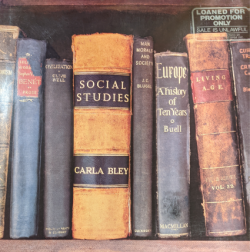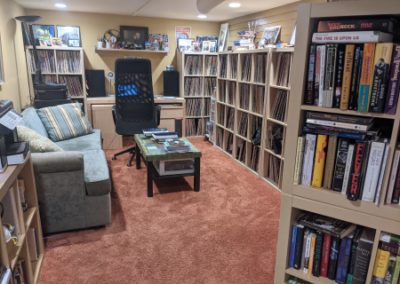.
.
.

The doors leading to my Portland office, now vacated after 20 years
.
___
.
…..With the aid of good fortune and health, life has a way of going on, even when external forces distract and alarm. A firsthand example: amid yet another flurry of extreme presidential chaos and the unending nightmare of COVID, I recently closed down the office space I have worked out of since 2000.
…..Shuttering and moving requires throwing out and organizing. Stuff gets boxed up. Shredded. Recycled. The task depends on patience and a sturdy spirit, and during it I discovered that, even though I’ve been retired for several years and have mostly put whatever gloom resulting from it behind me, closing a physical space that harvested my ideas and housed the work that came from them challenged me emotionally.
…..Moving causes stirring and reevaluating. Objects that haven’t been attended to or appreciated for years get jostled and seen and reminisced over. Art is removed from the walls and banished to the attic. Family portraits and once cherished photographs of long ago professional peers are briefly held, reflected on, and (mostly) tossed. Books, some a part of my library for fifty years, get thumbed through and reorganized, a substantial discard pile hauled to the local Goodwill. Cassette mix tapes recorded on reclusive 1970s and 80s weekends reveal my musical interests from that era – and would have been played if only I still possessed a cassette player.
…..What particularly challenged me emotionally was going through my record albums, which I began actively collecting in the late-1960s. In my teens and early twenties, paychecks were emptied in neighborhood record shops in Berkeley and Portland, and in my mid-twenties all the way until recently, I worked in the music and video business, acquiring vinyl, cassette tapes, and compact discs during my travels, and many in the collection were provided to me gratis by record companies seeking my influence. The record collection was spread out over two spaces – one in my basement office at home (where I now work), and the other in the office I was clearing out. The objective was to pare down the collection so whatever remained would fit in my home office space. A tough task, but one that was required (and made easier by the fact that my son – now also an avid record collector – would take any discards off my hands).
…..Thousands of records – each one with its own story to me, and all shelved library style and sorted alphabetically by genre of music – needed to be expeditiously handled and culled, a pile for the “yes, keep,” and a pile for the “discards.”

My copy of Carla Bley’s 1980 album Social Studies
…..So, I got comfortable, rolled up my sleeves, and reached into the jazz section, grabbing a handful of records and placing the pile face up at my feet. At the top was Carla Bley’s 1980 album Social Studies, which came into my possession at the time I was managing a wholesale record distribution company in Portland. The sales rep for Warner Brothers (who then distributed Carla’s label WATT) knew I was about the only guy in the market who would appreciate this album, so he laid it on me and I accepted it gratefully. I loved Carla’s music and was eager to discover what she and her band were up to following her previous album, Musique Mecanique.
…..I took it home – no doubt with a stack of other records – and over the course of at least a week or two became obsessed with this record, particularly by the track “Utviklingssang,” an absolutely gorgeous melody dominated by Michael Mantler’s trumpet and the utter spine-tingling play of the saxophonist Tony Dagradi. Just over six minutes of elegant, stunning beauty. Day after day I played this song. I cooked to it. I drank (and likely smoked) to it. I lay on the couch in my darkened living room with my headphones on, the volume cranked up, practically sobbing while consuming it. But listening at home wasn’t enough, so I made a tape of it and played it in the car on the way to and from work. I included it on a contemporary jazz mix tape and made copies for friends who I thought would appreciate it (there were only a scant handful). It spoke to me in ways few records did at that time in my life (I was 27, Carla was 45), filling me with an unforgettable warmth. I can now say with some certainty that listening to this song with such depth and at that time of my life was a spiritual experience. It was a gift to me.
…..Ultimately, of course, I burned myself out on it. Other recordings were demanding my ears’ attention, and the album began moving deeper into the “play stack” of records near my turntable, eventually filed away alphabetically among an expansive collection. Maybe I would get to it again later. Which I did, 40 years later.
…..Interestingly, several months ago – before I had any thought of moving out of my office space – I became aware of a new Carla Bley Trio album that I have enjoyed immensely. Carla (now 84 years old) is joined by the saxophonist Andy Sheppard and the bassist Steve Swallow for their fourth recording, a serene, rich, and beautiful demonstration of their current creative voices. It has occupied a special place in my current “stack” of albums, and now, at age 66, find myself obsessed with it.
…..Its title?
…..Life Goes On.
.
___
.

My current (and possibly final) office space
.
.
Listen (on Spotify) to the 1980 recording of The Carla Bley Band playing “Utviklingssang”
.
.
.
Listen to the 2020 recording of the Carla Bley Trio playing “Life Goes On”
.
.
.
.

































Life Goes On as we move on. Good luck in this next stage in what seems to be a very cozy space!
Thanks, Phyllis. What isn’t shown in that photo of my office is my 13 year old lab. She makes it even cozier! I am a lucky guy.
Yup, we’re at the stage of life to downsize and simplify. I remember back in the early 80’s when we rummaged through each others LPs quite often. I’m really enjoying giving records out of my collection to my granddaughter and young friends. Thanks for all the wonderful stuff you publish here. Happy New Year! And here’s hoping for more listening sessions later in 2021.